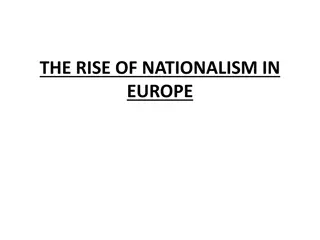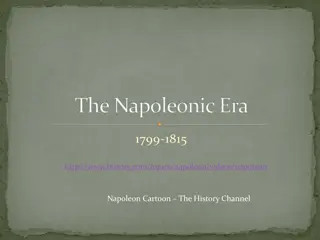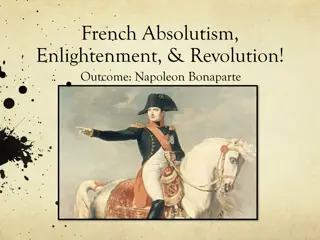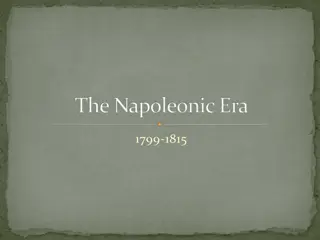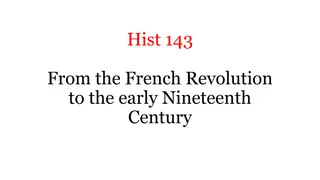Napoleon Bonaparte: A Revolutionary Leader and Reformer
Napoleon Bonaparte, born in 1769, emerged as a key figure during the French Revolution and played significant roles in the National Convention, the Directory, and the Consulate. He implemented various reforms in administration, finance, education, and religion, and led successful military campaigns in Italy, England, and Egypt. His rise to power as Emperor in 1804 marked a transformative period in European history.
Download Presentation

Please find below an Image/Link to download the presentation.
The content on the website is provided AS IS for your information and personal use only. It may not be sold, licensed, or shared on other websites without obtaining consent from the author.If you encounter any issues during the download, it is possible that the publisher has removed the file from their server.
You are allowed to download the files provided on this website for personal or commercial use, subject to the condition that they are used lawfully. All files are the property of their respective owners.
The content on the website is provided AS IS for your information and personal use only. It may not be sold, licensed, or shared on other websites without obtaining consent from the author.
E N D
Presentation Transcript
NAPOLEON BONAPARTE 1769 - 1821 CHILD OF FRENCH REVOLUTION
NATIONAL CONVENTION (1792 1795) THE DIRECTORY (1795 1799) CONSULATE (1799 1802)
A BRIEF HISTORY BORN ON 15THAUGUST 1769 IN CORSICA ARTILLERY OFFICER DURING FRENCH REVOLUTION BRIGADIER GENERAL ON 5THOCTOBER 1795 MARRIED JOSEPHINE ON 9THMARCH 1796
EARLY CAMPAIGNS ITALY April 1796 -April 1797 (18 Big+65 Small Battles) ENGLAND 1798 - Cross English Channel (Napolenic Method) EGYPT 1798 - Many Battles (Battle of Pyramids) 1798- Battle of Nile with Admiral Nelson
EMERGING TO POWER Soldier Artillery Officer (1789) Brigadier General (1795) Overthrow of Directory (1799) (5 Directors: Carnot, Letourneur, Rewbell, Larevelliere Lapeaux, Barras) New Constitution First Consul (1799) Consulate: Napoleon Bonaparte ( First), Abbe Sieyes (Second), Ducos (Third) Lifetime Consul (1802) Emperor (1804) New Constitution
REGULATIONS OR REFORMS Administrative Reforms Centralisation, Election for Local Government, Developed Secretariat of State Financial Reforms Improved Financial Condition, Regularised Tax Collection, Severe Punishment for Corruption, Bank of France (1800) Educational Reforms School in Commune, Supervision, Under Central Government, High School : Town
REGULATIONS OR REFORMS Educational Reforms Technical School, Civil Service School, Military School . Under State Regulation, University of France: Uniformity, Teacher Training School in Paris, Separate School for Girls Religious Reforms Concordat (August 1802) Restoration of Catholicism Pope and Napoleon
REGULATIONS OR REFORMS Public Works Reforms Prisoners of War, Improved Communication and Trade, High Ways, 1811: 220 Military Roads, 30 Roads: Paris and Borders, Two Trans Continental Roads, Bridges, Canal Net Works and Waterways, Sea Ports Legal Code Committee of Legal Codes: Civil Code, Penal Code, Commercial Code
REGULATIONS OR REFORMS Artistic Reforms Beautification of France and Paris, Restoration of Palaces, Avenues, Paris: Pleasure City of Europe Commercial Reforms Colonial Empire for France Failed . British Navel Supremacy
FOREIGN POLICY 1800: Battle of Marengo with Austria 1800: Battle of Hohenlinden with Austria 1803: Armed Neutrality (Russia, Prussia, Sweden, Denmark) 1805: Battle of Ulm with Austria 1806: Battle of Austerlitz with Russia and Austria 1806: Battle of Jena with Prussia 1806: Battle of Trafalgar with England (Navel) 1807: Battle of Eylau and Battle of Tilsit with Russia 1807: Battle of Friedland Russia
FOREIGN POLICY 1809: Battle of Wagram with Austria 1812: Battle of Borodino with Russia 1813: Battle of Dresden with Allies 1813: Battle of Leipzig with Allies (Biggest in Europe next to World Wars) 1814: Elba: ABLE WAS I ERE I ELBA 1815: Battle of Waterloo with Allies 1815: St. Helena 1821: 05.05.1821 Died Roll Up The Map Of Europe, It Will Not Be Wanted For These Ten Years
ECONOMIC FOREIGN POLICY CONTINENTAL SYSTEM England: Nation of Shop Keepers Not able to defeat Wanted to bring under Napoleon Advice of people in administration How to make it
It is through her commerce that England must be attacked; to leave her of her gains in Europe, Asia, and America is to leave her arms of her arms, to render conflicts and wars eternal. To strike England to the heart
Napoleon was not for it France self sufficient . But England Not England Had National Debt England: Monarchy, Aristocracy, Farmers, Shop Keepers ..Revolution
To kneel down England.. No Way Paris Delhi Boulogne Folkstone 1806: Berlin Degree All European Countries Pope Trade through France British in return Orders in Council If through French Vessels .. Capture All countries joined with France
Not able to supply price hike Britishers started to get friends Britain fell unemployment money value went down 1810 France and all countries went to bankruptcy Smuggling, Black Marketing, Hoarding Depression= 1810-1811 Because of this .spent Resources Crippled .Led for the fall of Napoleon







